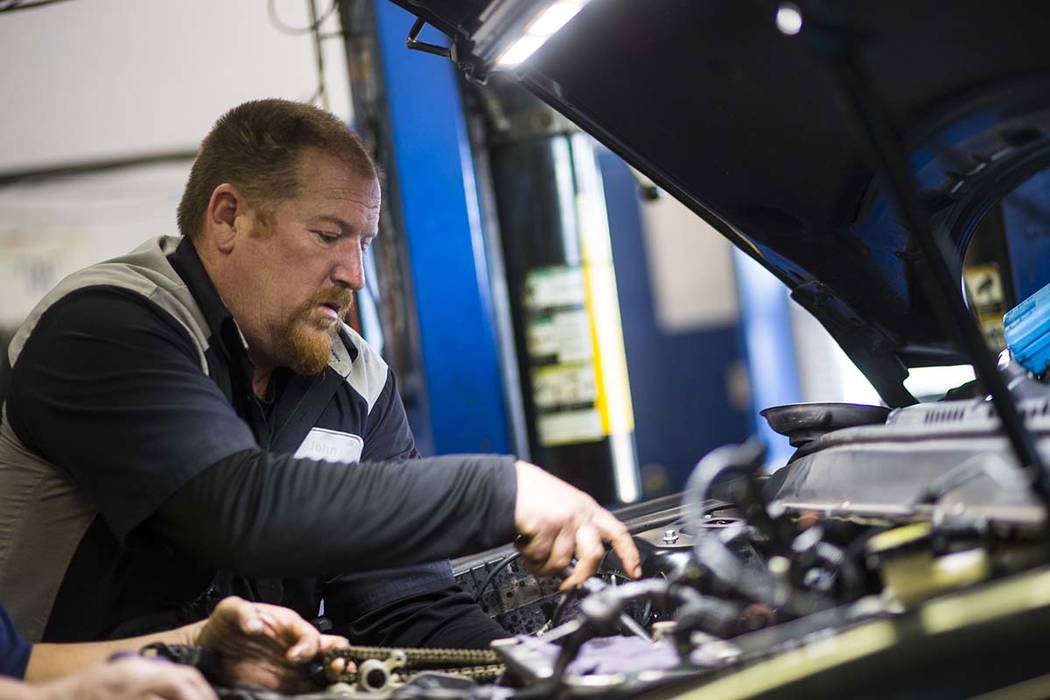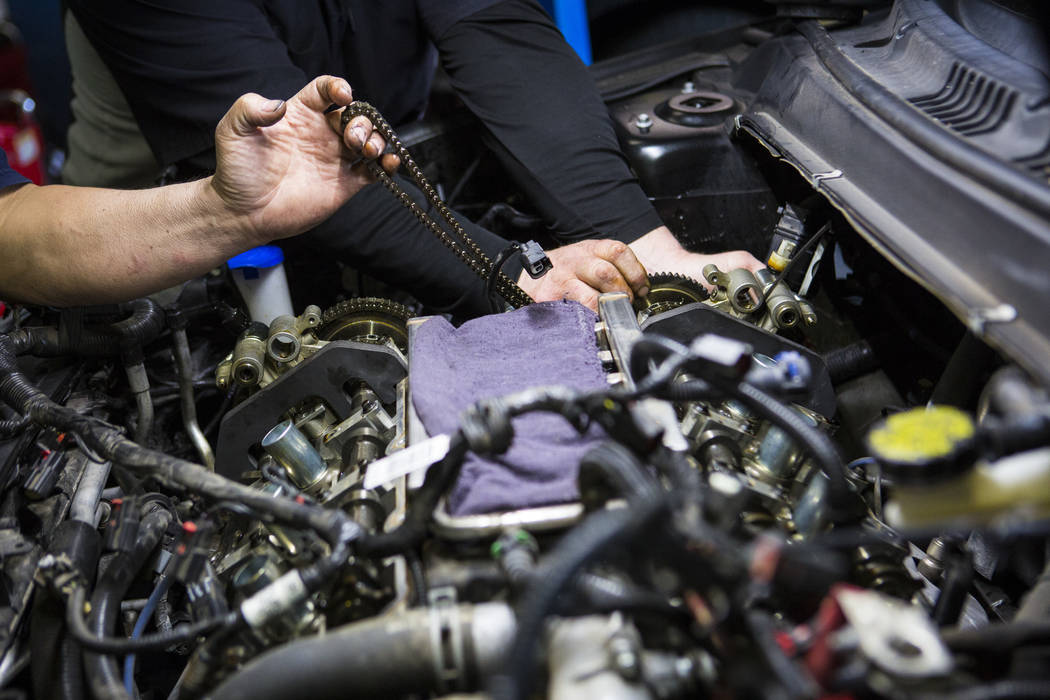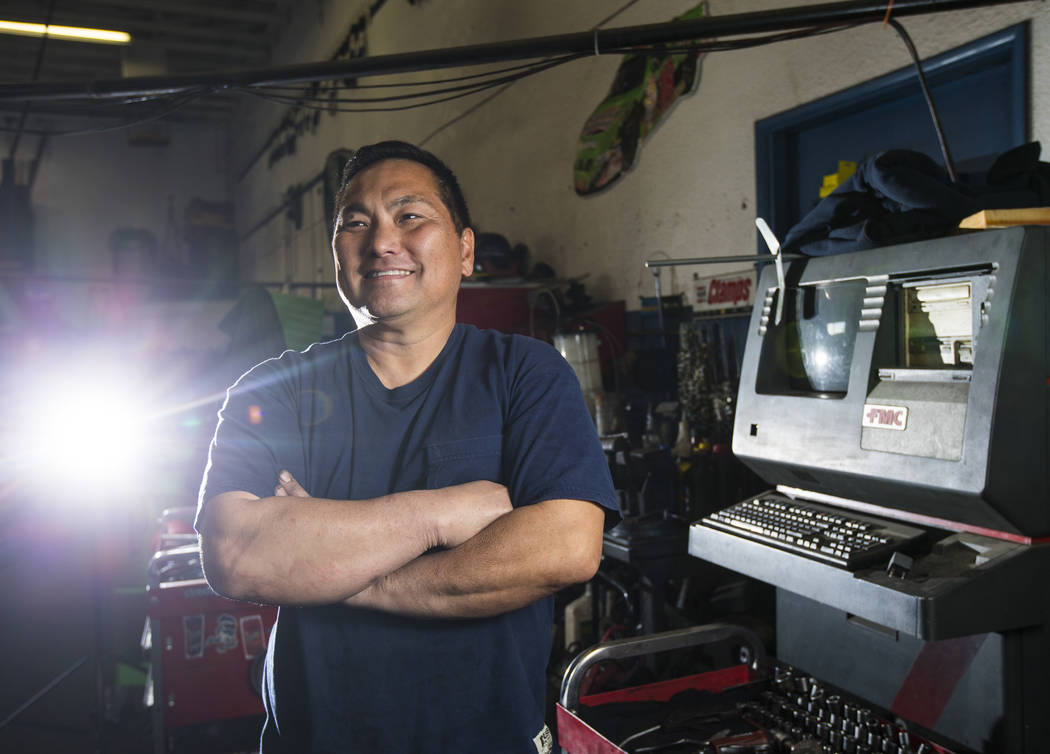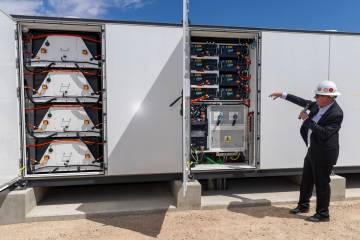Shortage of auto mechanics hits Las Vegas Valley
When Mike Spangler pops open the hood of his car, the inside mechanics look foreign.
Back in the ’60s, Spangler would do all the work on his car himself. Today he doesn’t even bother changing the oil.
“There are more onboard computers on your car than there were on the space shuttle,” said Spangler, dean of the College of Southern Nevada’s School of Advanced and Applied Technologies. “You not only need an elite set of technical skills. You need some very specialized tools.”
As the technology in cars continues to advance, it’s becoming more difficult to find auto mechanics and technicians who know how to work on the vehicles. According to data from the Governor’s Office of Economic Development, the Las Vegas auto repair industry, like the nationwide one, is facing a shortage of workers.
Recruiting challenge
Mike Chun, owner of Panda Auto in Spring Valley, is looking to hire. But the Las Vegas Valley is going through a dry spell of qualified candidates.
About three months ago, Chun said, he got lucky and found a qualified employee almost immediately. This time around, finding candidates with the right skill set is proving a challenge.
“We’ve received about 18” applications so far, he said. “I’m going to say about 75 percent of those aren’t going to have the set of criteria we need.”
On average, 76,000 automotive technicians will be needed each year between 2016 and 2026 to keep up with demand across the U.S., according to the Bureau of Labor Statistics.
The shortage has already hit Southern Nevada; there are about 4,300 employees in this field in Clark County, well below the national average of 5,100 for an area its size, according to a report released by the GOED through Emsi, an Idaho-based company that uses data from official government sources.
“The demand is great. The number of students that are entering these programs may be diminishing,” said Spangler. The shortage has been ongoing for decades, but “right now, it’s about as acute as I’ve ever seen it.”
The report, released in the fourth quarter of 2018, found about 800 job postings for auto mechanics and technicians in Clark County over the past year. Most of the postings were up about 40 days, longer than the regional median.
Paul Nakama, owner of Paul’s Auto Service in downtown Las Vegas, said advancing technology in cars has contributed to his struggle to find qualified candidates in the valley. Workers today need a much broader skill set than they did in years past.
“It’s very challenging because of all the computers they put in vehicles,” he said. “Before, it was more mechanical. Now it’s more electrical.”
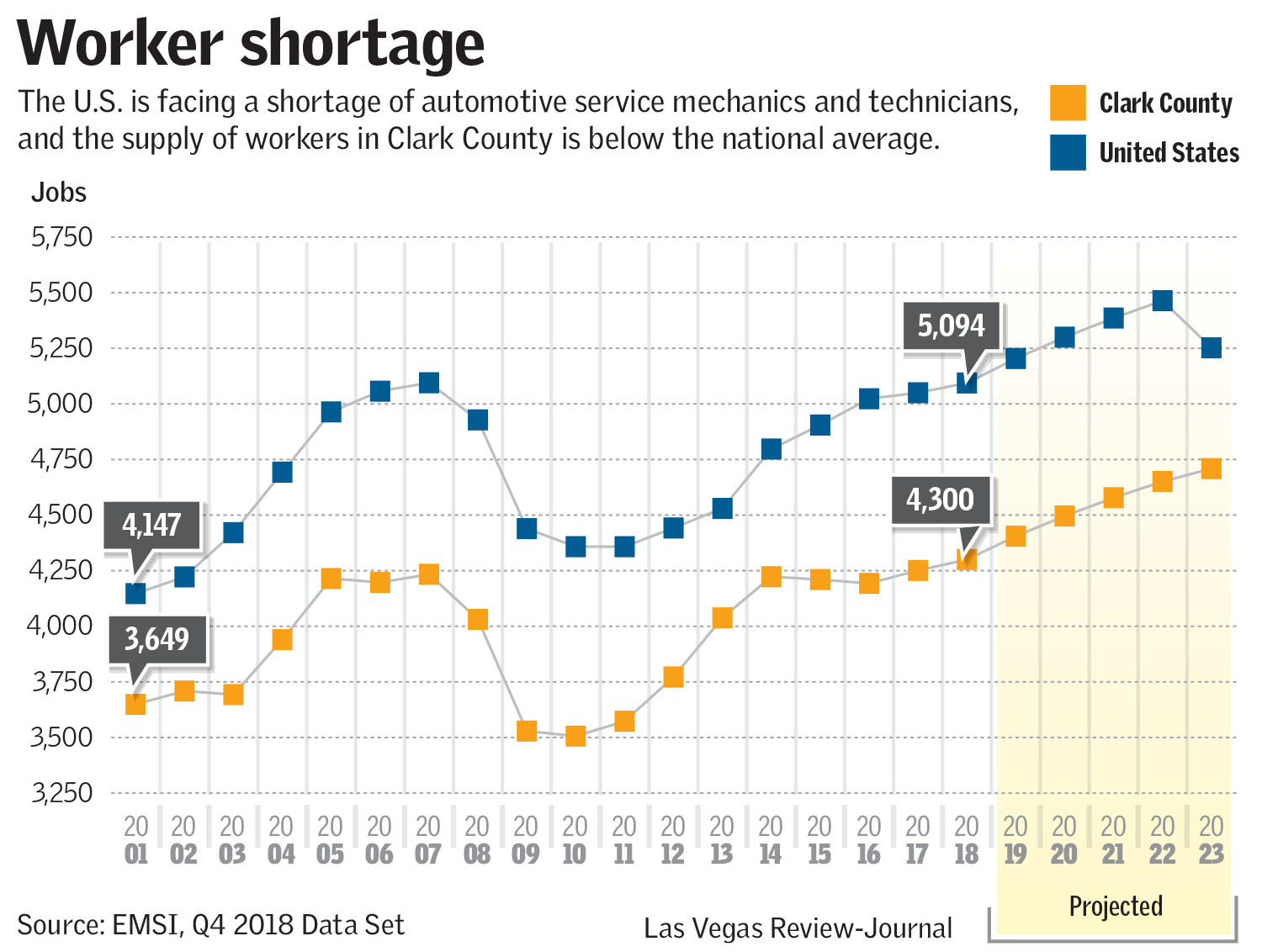
Impact on consumers
Service times, particularly in the collision industry, have gone up. Spangler said jobs that used to take two to three days now take a week or more on average.
But a longer wait time doesn’t equate to a discount, according to Chun. Demand for skilled workers has increased labor costs for repair shops, which transfer the costs to customers.
Additionally, demand continues to increase as more registered cars hit the road each year. The Bureau of Transportation Statistics reported nearly 269 million registered vehicles in the U.S. in 2016, a 7 percent jump from just 10 years prior.
Advancing technology
As technology in the auto industry continues to advance, there’s a chance it will shift from being one of the causes of the shortage to its solution, according to Barb Walden, interim dean of technical sciences at Truckee Meadows Community College.
“As technology continues to grow, tools are going to be manufactured that help one person do multiple jobs,” she said. “I think the shortage will be depleted by tech.”
But with more hybrids and electric vehicles hitting the road each year, Spangler said the shortage is going to get worse before it gets better.
“It’s going to be more acute as we go because there’s newer technologies that are coming out,” he said. “Who would’ve thought that an automotive technician would have to worry about pulling in global position satellite signals (for self-driving vehicles)?”
A shortage of skilled workers might slow the deployment of vehicles, Spangler said.
“It’s part of the consideration for the manufacturers on how fast they can deploy,” he said. “They’ve got to have people that can service and maintain these vehicles safely. Pulling a battery on a high-voltage system is a very big deal.”
Closing the gap
Spangler said it’s a great time to enter the field, with job prospects “off the charts.” But the industry needs to go through some major changes to draw in more workers, he said.
“One of the things we need in the transportation tech area is a way to make it sexy,” he said. Automotive technicians are “skilled, professional technicians, good diagnosticians, but that shade-tree mechanic, grease monkey image has got to be overcome.”
Walden said she’s seen a growing trend of students believing they need some form of bachelor’s degree. She argued it’s not for everyone, and Truckee Meadows has been making moves to reach out to more students and educate them about alternative career paths through events like job fairs.
But more needs to be done, Walden said. She believes higher wages would help draw in more people.
According to Emsi data, the median wage for auto service technicians and mechanics in Clark County is $17.50 an hour.
According to the Department of Education, Training and Rehabilitation, the mean wage in Nevada in 2016 was $21.17 overall and $20.41 for automotive service technicians and mechanics.
In Clark County, the numbers are less appealing. The Emsi report found the median wage for auto service workers in Clark County is $17.50 an hour. The average hourly wage in the Las Vegas Valley is $21.37, according to the Bureau of Labor Statistics.
With most mechanics paying tens to hundreds of thousands of dollars to build their toolkit, Nakama said it can take years for workers to make their money back.
Bob Potts, research director for the GOED, said he expects a rise in wages, but it will take time.
“It’s not a very high wage,” Potts said. “If there’s extra demand, generally you see wage appreciation in this. … It’s in a period now where demand is going up, so wages are going up, but there’s going to be a lag for the workforce to realize what that means for them.”
Contact Bailey Schulz at bschulz@reviewjournal.com or 702-383-0233. Follow @bailey_schulz on Twitter.



